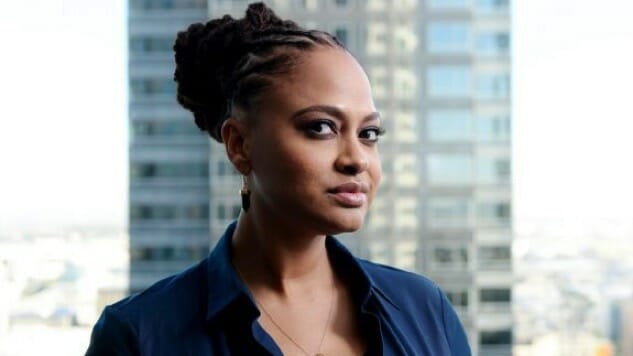On Ava DuVernay, Progress and the Tragedy of Being “First”

The names of two black women have been trending, flooding timelines and thus been on my mind over the past two days: Ava DuVernay and Korryn Gaines. These two names, I think, speak to a very strange position of black women in America today. There is excitement and triumph, as our voices and stories seem to be in high demand; this is still the year of Beyoncé’s Lemonade, and it’s significant that we’ve also seen women like DuVernay, Serena Williams, Issa Rae, Dr. Hadiyah-Nicole Green, Franchesca Ramsey, Simone Bile, Lena Waithe and others making headlines, hitting milestones and achieving progress, or “progress,” depending on how the term is to be understood. Progress is a complicated idea because Ava DuVernay just made history for black women, days after yet another black woman was killed by police officers—and because of the narrative police are putting forth (a narrative many are questioning and problematizing), Korryn Gaines is not even being mourned by the majority of the public, let alone celebrated. So, as is often the case, it’s a bizarre, beautiful, exciting and still, always, tragic time to be black, woman and living in America.
DuVernay becoming the first black woman (and third woman) to direct a live-action film with a $100 million budget (A Wrinkle in Time), is not just proof of her talent, or of the changes taking place in segregated Hollywood. Her gain, and our gain, necessarily reflects certain loss. As DuVernay herself put it, she certainly isn’t the first black woman to be capable or deserving, and the world of film has indeed been missing out on some wonderful voices, many which would have been equally deserving of being “first.” I can’t help but wonder if we mourn those voices and stories, as much as we celebrate and rejoice those symbols of progress. Can we—audiences, critics, journalists—do both, in an effort to further challenge these systems that declare who is first and who comes next; and in an effort to demand more and more voices be heard alongside DuVernay’s?
Every time there is a “first” in the black community, I hear that line from Chappelle’s Show: don’t ever be the first black person to do anything (because it’s always a terrible story), and I wonder about the pressure that person must be feeling. It’s a terrifying pressure, should you give in to it, one way or the other (ESPN’s O.J.: Made in America brilliantly explored the power of such pressure, and one celebrity’s attempts to flee from it). Those black people who break down barriers—those “firsts”—don’t always do so willingly and aren’t always interested in bearing the cross that comes along with it.
And there’s always a cross to bear.
For this reason, against my better judgement and against my knowledge that “progress” is a complex (often mythical idea), I can’t help but celebrate the fact that this particular first is being seen by Ava DuVernay. Sure, it could have been another black woman and it should have been, much in the same way that she should not be only the third woman to have earned a big budget feature. But if it had to be someone this year, we might be thankful it’s DuVernay. This is someone who, as we’ve seen with her own film collective ARRAY, is not content with merely being given a platform, but is determined to flood that platform with more women and people of color. She is someone who’s not content with merely getting to make a TV show, or even getting to make a show about black people from varying socioeconomic backgrounds, but someone who will do her part to attempt to balance Hollywood’s scales by employing only women directors.
“Every single episode is directed by a woman. It isn’t something that we see hardly enough. If Game of Thrones can have all men for the last 3 seasons, Queen Sugar can have all women and show what a fantastic show can be made from our hands and our minds.”
So yes, if we are going to have someone be first to break through a very high ceiling for black women in Hollywood this year, I’m so glad it’s the same person who wore an “I Can’t Breathe” shirt on the red carpet, and the same person involved in this year’s powerful #MLKNOW event. More than a symbol of progress in a racist and sexist America that has birthed a racist and sexist Hollywood, she is further proof that politics and art can and must mix—that we cannot critique a system without offering up our own work as a solution to the system’s problems. DuVernay is one of a handful of prominent artists who believes that inclusivity is not just Hollywood’s problem, but her problem too.
-

-

-

-

-

-

-

-

-

-

-

-

-

-

-

-

-

-

-

-

-

-

-

-

-

-

-

-

-

-

-

-

-

-

-

-

-

-

-

-








































